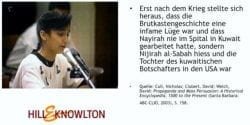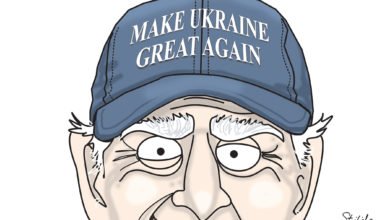Beware of Deep State Rumors of War

Nijirah al-Sabah is the name to remember as hawks in Washington demand war against Russia for its alleged hack of U.S. agencies. You might remember her as Nurse Nayirah.
She was the sweet little thing that public relations firm Hill & Knowlton introduced to Congress and the rest of the country some 30 years ago to offer heart-wrenching testimony after witnessing Iraqi soldiers take babies out of incubators in a Kuwaiti hospital, take the incubators, and leave the babies to die.
Al-Sabah took acting lessons at the request of the CIA before testifying before the Congressional Human Rights Caucus, which Reps. Tom Lantos (D-CA) and John Edward Porter (R-IL) co-chaired, Oct. 10, 1990. A Holocaust survivor, many looked to Lantos as the conscience of the House – until then.
It turned out al-Sabah was not in Kuwait to witness anything. She was in Washington, D.C., with her father, Saud Nasir Al-Sabah Kuwait’s then-ambassador to the United States. All of her testimony was a lie.
What the Bush administration and media did not open debate on was whether the war was an attempt to secure access to Kuwaiti oil resources?
If Nurse Nayirah is too far back to remember, 13 years later, another Bush administration was banging the war drum to battle Iraq again. You remember it was after Saudis attacked the Pentagon and World Trade Center. One is better off not thinking the period of history through logically. Instead, think “slam dunk” or Weapons of Mass Destruction.” Lies, all of it.
Media critic and Ithaca College journalism professor Jeff Cohen explained the government/media marriage like this.
“Most of the things that the American people believed about the war were false,” he said. “CNN and other TV news networks dedicated their energy to covering new war technologies, such as the Patriot Missile and Smart Bombs guided by lasers. Americans later learned these technologies were hoaxes and nearly complete failures.”
Although Cohen is an acknowledged American critic, his criticism did not come in the U.S. media. RT, or Russia Today, wrote about it in 2011.
Recently the Washington Post published several articles with unnamed sources citing alleged Russian espionage as the worse thing since coronavirus. It credits Reuters with breaking the story.
Reuters international edition points out experts say the hack would not be considered an act of war under international law and will likely go down in history as an act of espionage.
“Warfare implies violence, death and destruction,” then news outlet quoted Duncan Hollis, a professor of law at Temple University specializing in cybersecurity.
Hollis and other experts said the attack appears to have been carried out to steal sensitive U.S. information and should be viewed as espionage.
“Simply stealing information, as much as we don’t like it, is not an act of war — it is espionage,” said Benjamin Friedman, a policy director at the think tank Defense Priorities.
Cyber attacks can be acts of war if they cause physical destruction. These might include operations that “trigger a nuclear plant meltdown; open a dam above a populated area, causing destruction; or disable air traffic control services, resulting in airplane crashes,” Reuters cited a Department of Defense law-of-war manual saying.
Cohen said, “The most classic hoax was the 300 Kuwaiti babies that were allegedly taken out of incubators and killed so that the incubators could be sent back to Iraq. It was a total falsehood.”
This lesson is important when framing what some want you to believe is Moscow’s war on Washington. The US media did not investigate the Iraq buildups; it merely carried and conveyed US propaganda. Mainstream media based its stories on what came across as patriotic and served the war effort. That countered a generation of negative backlash from coverage of the Vietnam war, but it did not further democracy.




